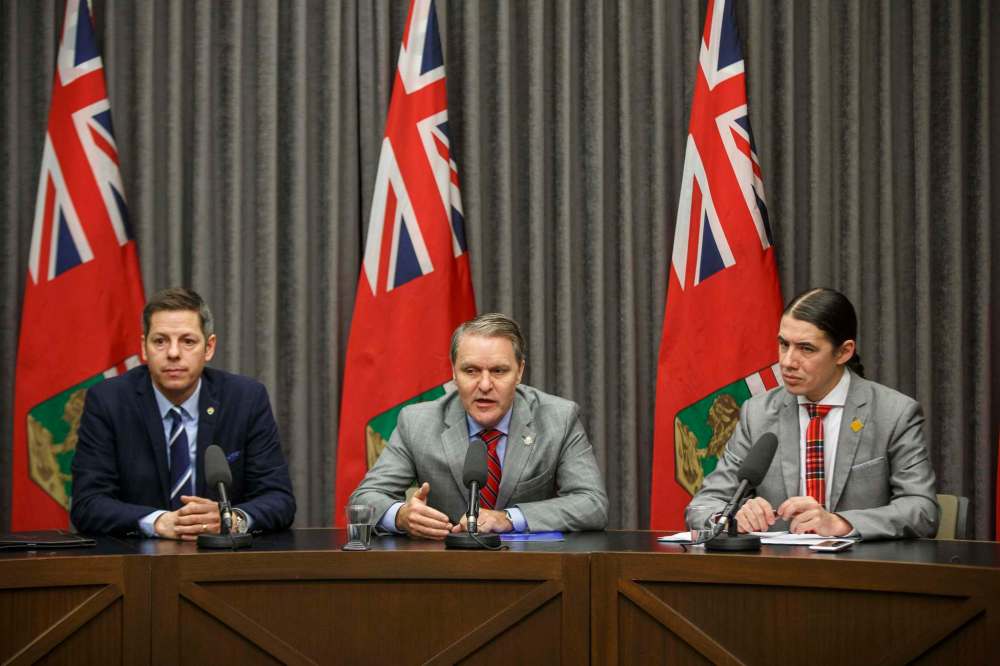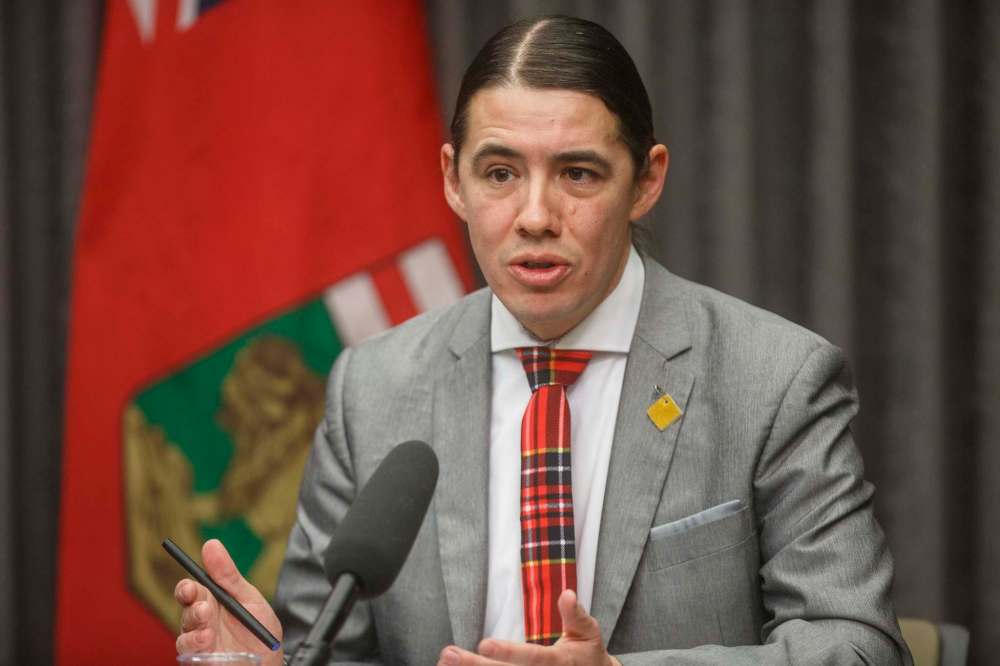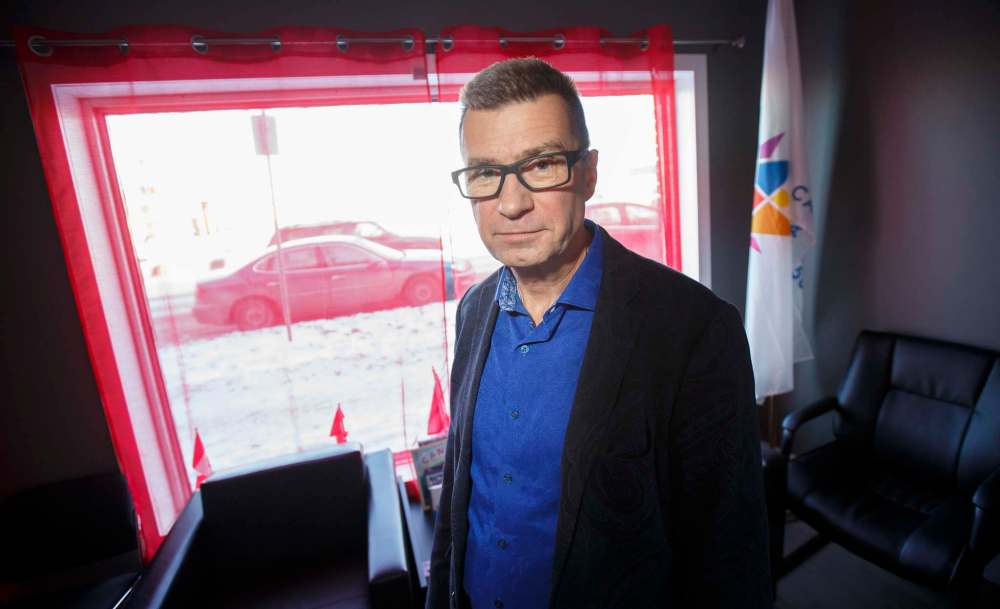Meth task force is underwhelming reaction
Advertisement
Read this article for free:
or
Already have an account? Log in here »
To continue reading, please subscribe:
Monthly Digital Subscription
$0 for the first 4 weeks*
- Enjoy unlimited reading on winnipegfreepress.com
- Read the E-Edition, our digital replica newspaper
- Access News Break, our award-winning app
- Play interactive puzzles
*No charge for 4 weeks then price increases to the regular rate of $19.00 plus GST every four weeks. Offer available to new and qualified returning subscribers only. Cancel any time.
Monthly Digital Subscription
$4.75/week*
- Enjoy unlimited reading on winnipegfreepress.com
- Read the E-Edition, our digital replica newspaper
- Access News Break, our award-winning app
- Play interactive puzzles
*Billed as $19 plus GST every four weeks. Cancel any time.
To continue reading, please subscribe:
Add Free Press access to your Brandon Sun subscription for only an additional
$1 for the first 4 weeks*
*Your next subscription payment will increase by $1.00 and you will be charged $16.99 plus GST for four weeks. After four weeks, your payment will increase to $23.99 plus GST every four weeks.
Read unlimited articles for free today:
or
Already have an account? Log in here »
Hey there, time traveller!
This article was published 19/12/2018 (2550 days ago), so information in it may no longer be current.
The announcement seemed out of step with the issue at hand
Last week, the city, province and federal government announced a tri-level task force to address the methamphetamine crisis that grips Manitoba.
Manitoba Health Minister Cameron Friesen trumpeted the task force as the first of its kind in Canada, a unique partnership between the three levels of government to tackle a pressing issue of health and public safety. “We know the destruction (meth) causes to families and individuals’ lives,” Friesen said. “We’re sitting here because we’re saying we want to work together.”

However, while collaboration may be the intent of the task force, the true impact is to the government’s response in the face of a true crisis.
Despite evidence that meth represents a rapidly growing, increasingly deadly problem, the task force has been given more than six months to organize, study and report on ways to deal with social, health and justice implications of the meth crisis.
Using great fanfare to announce that you’re giving a task force six months to study a problem that is ravaging the province is like announcing with great gusto that you’re entering a horse-drawn carriage in the Indianapolis 500. Interesting, but ultimately doomed to fail.
The task force idea was born in September when Winnipeg city council passed a resolution calling for all three levels of government to come together and forge a tripartite strategy to address the meth crisis. The city threatened to form its own working group if the other two levels of government did not pitch in by mid-November.
Discussions began in October on creating the task force but became bogged down for weeks, eventually pushing beyond the city’s original deadline, according to sources familiar with negotiations. The major hurdle, the sources said, was Ottawa’s choice for its representative: Liberal MP Robert-Falcon Ouellette.
The province balked at Ouellette’s involvement, hoping instead to get someone with more seniority within the Liberal government in Ottawa. Someone like International Trade Minister Jim Carr. Federal officials said Ouellette needed to be involved at the forefront of the task force’s work given that his core-area riding, Winnipeg Centre, sees more than its fair share of meth-related misery.
Ultimately, a compromise was reached with a pledge that Charleswood MP Doug Eyolfson, a physician with an extensive background in emergency medicine, would support the task force. Given his background, Eyolfson has been a frequent participant in the debate over a governmental response to meth.
In its essence, the task force is not a bad idea. City officials will point out that past tripartite and bilateral efforts in the early 2000s helped put a dent in problems such as arsons and auto thefts. Tripartite cooperation has also brought many new infrastructure projects and amenities, such as The Forks Market and national park, and the Canadian Museum for Human Rights.

It is true that the best outcomes often come when all levels of government are working in concert.
However, it is impossible to ignore the fact that the timetable for this task force will allow all three levels of government to push off significant new expenditures needed to address meth well into the next fiscal year, which begins Jan. 1 for the city and April 1 for the provincial and federal governments.
That delay is extremely fortuitous for the provincial Progressive Conservative government, which is walking a very fine line right now to maintain its fiscal tack.
The province’s second quarter financial report, which was released on Wednesday and covers the period between July and September of this year, is a graphic reminder of just how tight the provincial budget is and will be for the foreseeable future.
The province is forecasting a small improvement on the provincial deficit, down to $518 million from $521 million estimated in last April’s provincial budget. That is quite an accomplishment given that the Tory government has suffered a series of setbacks on the revenue side of government finances.
Chief among those setbacks was Premier Brian Pallister’s decision to withdraw his own carbon tax plan. That eliminated $143 million of tax revenue that was factored into the current budget. To help offset the impact of that decision, the province has underspent by more than $107 million, including coming in $50 million under budget in health care.
No matter how you slice it, this just doesn’t look like a government that wants to pump money into addiction and mental health services — both desperately needed to address meth’s unique profile — at the risk of arresting the deficit’s downward trajectory. That image was fortified with comments made by Pallister in his year-end interview with the Free Press.
Pallister said that while he acknowledges the need to address the meth crisis, he described it as just one of many priorities his government faces.

“What I cannot ever do as premier, and what our government cannot do, is forget that there are a lot of other people in the province that have other priorities at the same time that may not involve meth,” he said.
If long-term solutions are the goal of the task force, then there is really no excuse for the three levels of government to look for some meaningful short-term measures as well. To date, the provincial and federal government have only been able to find a combined $8.4 million to expand addiction treatment, a drop in the bucket when compared to the tsunami of death, destruction and misery meth is has unleashed on this province.
But only if those governments involved in the task force are willing to see meth as a crisis that requires immediate attention. And to date, not all governments believe that to be the case.
dan.lett@freepress.mb.ca
@freepress.mb.ca

Born and raised in and around Toronto, Dan Lett came to Winnipeg in 1986, less than a year out of journalism school with a lifelong dream to be a newspaper reporter.
Our newsroom depends on a growing audience of readers to power our journalism. If you are not a paid reader, please consider becoming a subscriber.
Our newsroom depends on its audience of readers to power our journalism. Thank you for your support.



